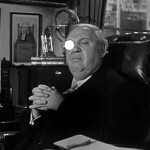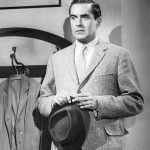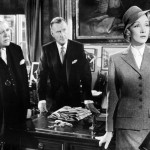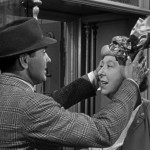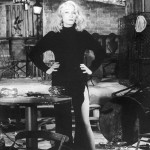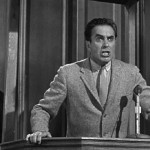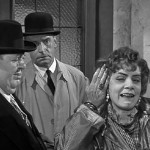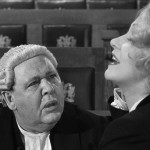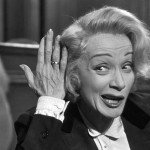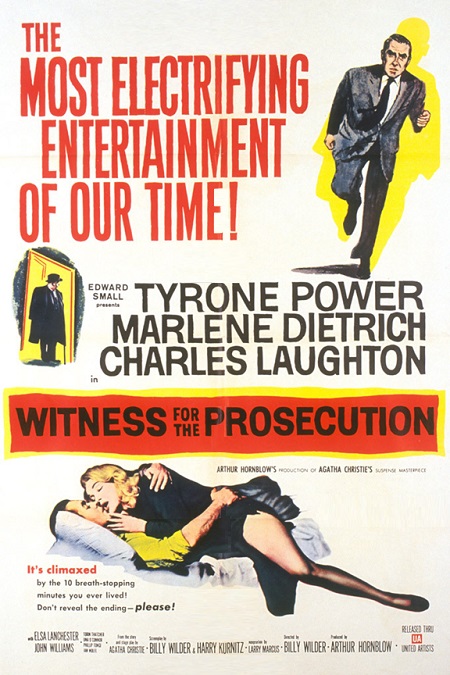
Witness for the Prosecution – 1957
The defining aspect of this movie was the ending. I’m going to say that right off the bat because not only did I not see it coming, it was completely plausible. This film masterfully delivered the classic movie trope of the surprise twist, accomplishing the feat through the incredible talents of its cast of actors. This switch was a trait that was common to the works of the writer of the original play upon which the film is based: none other than Agatha Christi.
The film touted several big names like Tyrone Power, Charles Laughton, and Marlene Dietrich. I’ve seen the two men in other films I’ve watched like Mutiny on the Bounty, Les Miserables, In Old Chicago, and The Razor’s Edge, so I know their talents, but Dietrich surprised me. This is the first of her films I have had the pleasure to watch. She did a fantastic job, and in order to explain why, I’ll have to give away the movie’s big finish.
Laughton played Sir Wilfrid Robarts, a British barrister in ill health who takes on Leonard Vole, played by Power, as a client. He is being charged with the murder of a woman who was in love with him, and who, it turns out, left him a very large sum of money in her will. Vole claims innocence. Then his wife Christine, played by Dietrich, enters the picture. She seems cold and studied, but devoted to her husband.
What follows is a trial in the British court system. I was reminded of the stereotypical courtroom drama TV shows like Perry Mason and Matlock. The prosecution called witnesses who gave their testimony and Sir Wilfrid did his best to discredit them. But things got interesting when Mrs. Vole was called to the stand as a Witness for the Prosecution. (Roll credits!) She gave testimony that strongly pointed to her husband as the murderer who she now claimed to hate. I didn’t know it at the time, but it was all set-up for the big plot-twist that was to come.
But just when things seemed to be going badly for our main characters, a mysterious Cockney woman shows up who provides the perfect evidence to prove that Vole was completely innocent, and that Mrs. Vole had lied on the stand, committing perjury. Because of this convenient evidence, Vole is found not guilty and set free.
Here is where I found Dietrich’s acting to be incredible. When Mr. Vole was acquitted, we learn that he actually had killed the deceased woman, and that his wife knew it. It was she, in disguise, who was the mysterious woman, providing the perfect evidence to set her beloved yet guilty husband free.
As I was watching, I was slightly incredulous, thinking that there was no way Sir Wilfrid would not have recognized the woman in disguise. But after thinking about it, I realized that I had certainly been fooled. Why would the barrister be any different? When Dietrich played the mysterious woman, her entire persona transformed into another character.
Dietrich, as an actress, was known for having that calm and cold exterior, and that’s exactly what she gave us for most of the movie. But when she put on that disguise, I had no idea that it was her. Her voice, her mannerisms, her posture, and of course, her look all changed so completely that the thought that it was Dietrich playing the part never even occurred to me. Sure, I’ll admit that I was also fooled by my own expectations and perceptions of who the actress, Marlene Dietrich was, but however it happened, I was indeed fooled. Well played, Marlene.
Just as an interesting note, when the film was originally shown in theatres, there was a voice-over at the end of the movie which gave an instruction to the watching audiences. This instruction is now part of the movie and is retained on the DVD. It said “The management of this theatre suggests that for the greater entertainment of your friends who have not yet seen the picture, you will not divulge, to anyone, the secret of the ending of Witness for the Prosecution.” I wonder how well this ploy worked. But that was not the end. There was one more twist that happened in the last few minutes… but I’ll leave that one for you to find out about on your own.
